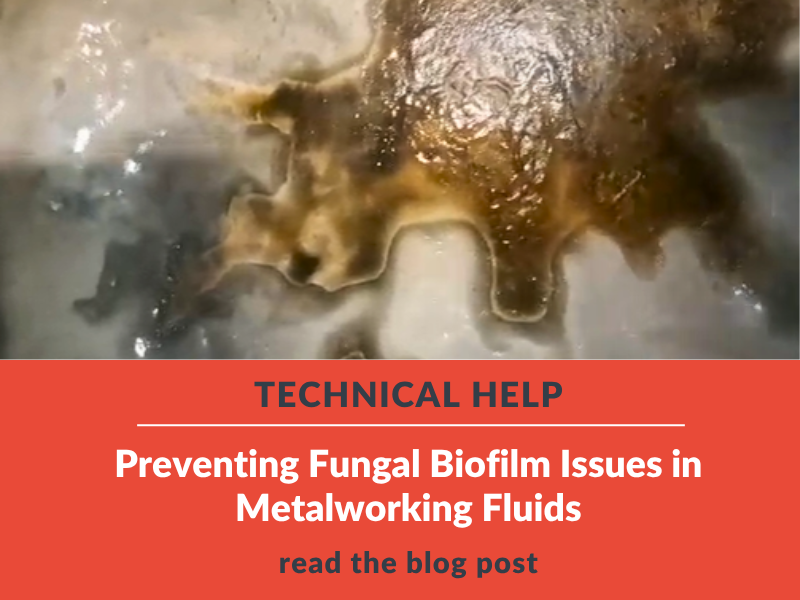
If you manage machines using water-based metal working fluid (MWF), you may see a sticky grey/brown film forming on tank walls or floating on surfaces. That’s the early stages of the formation of a fungal biofilm, a mix of fungus, oil, and grime. Below, we break down how it forms and how your team can tackle it before it becomes a serious problem.
Tramp oil is unwanted lubricant (hydraulic oil, slideway oil, etc.) that leaks or seeps into your coolant from the machine tool. Unlike the coolant emulsion, it doesn’t mix well. Instead it floats, forming slicks on the surface. These slicks are ideal for fungi: they act like a “raft” on which spores can land, and they provide nutrients that fungi feed on.
Fungal spores are almost everywhere ; air, dust, even clothing. In a well-maintained coolant system, chemistry (biocides, pH control) keeps them in check. But if your dilution falls then the biocide/ fungicide strength weakens, pH drifts down and spores can germinate and grow into thread-like structures (hyphae).
Those ‘hyphae’ attach to surfaces like tank walls, filter housings, pipes. The interface between the tramp oil and emulsion is an ideal zone for the fungi to proliferate. They spread outward, sending tiny filaments across surfaces and through oil layers.
As the fungi grow, they secrete a sticky substance (think sugars, proteins, lipids) often called a biofilm matrix. This glue traps:
The result: a slime layer or film that sticks stubbornly to surfaces or floats as mats.
Once in place, the film is hard to knock off. It blocks chemicals and biocides from working effectively because the outer slime layer shields inner cells. Inside, there may be zones with less oxygen, letting fungi and bacteria cohabit. Over time it thickens, darkens, and further degrades coolant performance.
This issue can quickly become a costly, high-maintenance problem.
This is where a structured coolant management service comes into play. While the full details of Procare Fluid Management are available on our services page, here’s how the right approach supports you:
On top of all that, Procare Fluid Cloud (our new digital web app) gives you real time insight into coolant health. With Fluid Cloud, you can:
It turns coolant management from reactive to proactive: you see trouble coming, not after it’s already entrenched.
Seen slime, black mats, or have unpleasant odours? Don’t wait until things worsen. Get in touch with our technical team on 0114 285 2987 or email [email protected]. We’ll help you diagnose, plan immediate steps, and prevent the biofilm from getting the upper hand. And remember: Our advice is always free!